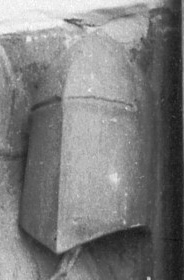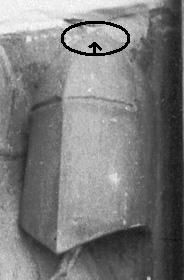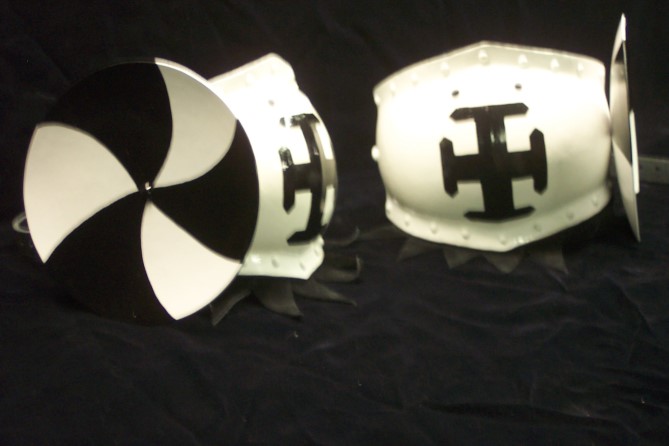according to sources the pembridge helm was associated with sir richard pembridge who died in 1375. it may have been used b him in battle. though it weighs 7 pounds im not sure whether this is too heavy for combat or not.
http://gallery.the-exiles.org/view_photo.php?...amp;id=aak
| Nathan Quarantillo wrote: |
| Woo! ok, serious response time!
And my Teutonic knight kit will cover ALOT of time ground. From the late 13th to late 14th cent. I plan to get a Helm that is Pembridge in it's styling. Yes, yes, too early for 13th cent, I'll be wearing my coif with that version. And no great crest for me. I had the hood sized to wear over the helm. I will have decor, in the form of a brass cross in the center, and it being painted black and white. Per Pale. And the Mantle and Surcote are all linen. Cotton isn't period, and wool is bloody hot. :\ And I like bascinates and all, but they're a bit too limited. Only 14th cent. And I'm a great helm kinda guy. Bucket-head looks all the way! ;) |
Don't forget the Cervelière over or under the coif that was often worn without the Great Helm with the Great Helm put on when battle was imminent and mostly for mounted combat I think.
By the way a close fitting Cervelière looks rather cool with maille coif over it, and very comfortable and not top heavy like many other types of helms.
If you want to try this combination make sure that your great helm is big enough to fit over the Cervelière + coif +padded arming cap.
I won't be using an exact replica of the Pembridge. The Helm I'm looking at has features based off of it to keep it 14th century. And the cervelliere look is nice, but I think I'll make it a later improvement purchase...
| Sander Marechal wrote: | ||
It's not, really. Have a look at the Codex Manesse. Everybody is doing outrageous helmet crests. It's not something specifically to Teutonic Knights at all. I'd even hazard to guess that everyone but the Teutonics (and other knightly orders) were doing such crests. The rules of their order would probably have forbidden too outrageous displays. |
also btw. i said its ICONIC. lwhether they actually wore them into battle is another story,. but if you google teutonic knight.about 70% of images show the hauberk wearing, horned greathelms of various designs in the pictres. so to say its not iconic. id sayis wrong, but id be willing to accept its ahistorical
| Nathan Quarantillo wrote: |
| I won't be using an exact replica of the Pembridge. The Helm I'm looking at has features based off of it to keep it 14th century. And the cervelliere look is nice, but I think I'll make it a later improvement purchase... |
If you want a great helm (I love them too) that covers the whole 14th century, use a sugar loaf one. They can be seen form the '80s of the 13th century to the and of the 14th.
http://www.casiberia.com/prod_Detail.aspx?id=AB1340
Justo one problem: for the late 14th you must have a bascinet under it. Althought you wont be historically accurate. That's the big withrawal of the great helm (and why I'm switching to a visored bascinet instead!).
http://manuscriptminiatures.com/lancelot-cycle-rawl-d-899/1801/
http://manuscriptminiatures.com/histoire-du-s...ncai/1385/
http://effigiesandbrasses.com/monuments/burch.../original/
| Nathan Quarantillo wrote: |
| I won't be using an exact replica of the Pembridge. The Helm I'm looking at has features based off of it to keep it 14th century. And the cervelliere look is nice, but I think I'll make it a later improvement purchase... |
1375, the date the helm's owner died, is in the 14th century. Will that alone not "keep it 14th century?"
| Augusto Boer Bront wrote: |
| If you want a great helm (I love them too) that covers the whole 14th century, use a sugar loaf one. They can be seen form the '80s of the 13th century to the and of the 14th.
|
I'd love to see evidence of this. Looking at surviving great helms form 1300 on you see separate riveted-on crown plates as the norm, not the peak of the sugarloaf. In fact, there are no surviving helm I know of that are of the sugarloaf form. The form is known from period art.
On top of that, most great helms you see in art past 1325 (or thereabouts) is usually crested, making it hard to tell what the top looks like. I think it's a stretch to say the sugarloaf covers a full 100 years since I haven't seen evidence for that.
| Chad Arnow wrote: | ||
I'd love to see evidence of this. Looking at surviving great helms form 1300 on you see separate riveted-on crown plates as the norm, not the peak of the sugarloaf. In fact, there are no surviving helm I know of that are of the sugarloaf form. The form is known from period art. On top of that, most great helms you see in art past 1325 (or thereabouts) is usually crested, making it hard to tell what the top looks like. I think it's a stretch to say the sugarloaf covers a full 100 years since I haven't seen evidence for that. |
No evidence? Sorry, but I just posted two miniatures and an effigy. Isn't that enought evidence for you?
Well, more effigies then. (I absolutely mean no disrespect in this reply)
http://effigiesandbrasses.com/monuments/berin.../original/
http://www.bildindex.de/bilder/mi08955j10a.jpg
http://www.bildindex.de/bilder/fm784155a.jpg
http://www.bildindex.de/bilder/mi02498g10a.jpg
| Augusto Boer Bront wrote: |
| No evidence? Sorry, but I just posted two miniatures and an effigy. Isn't that enought evidence for you?
Well, more effigies then. (I absolutely mean no disrespect in this reply) http://effigiesandbrasses.com/monuments/berin.../original/ http://www.bildindex.de/bilder/mi08955j10a.jpg http://www.bildindex.de/bilder/fm784155a.jpg http://www.bildindex.de/bilder/mi02498g10a.jpg |
None of those helms are definitively sugarloafs. You can't see them from the side to see if it comes to a peak (more or less) or in enough detail to see if there is a separate crown plate riveted in. Plus, many of them are covered on the top making the helm's top speculative. A central ridge does not mean it's a sugarloaf as many (most) helms with a riveted-in crownplate, which are not sugarloafs, have a medial ridge. Without more detail, calling helms of the latter half of the 14th century sugarloafs is a reach. We have surviving great helms of that era that are not sugarloafs. And not all non-flat-topped great helms are sugarloafs. That term is used to describe the peaked form popular late in the 13th century.
The Black Prince's helm has a medial ridge, but no separate crown plate, but still isn't a sugarloaf. :)
In your earlier post, the two miniatures are late 13th century and prove nothing about the use of the sugarloaf in the 14th century. :) The effigy's helm has a covered top and is shown from the front. Since it dates from the 1370s, it's more likely that it's constructed similarly to the Pembridge helm than to helms in use 100 years earlier.
Sorry, but I have to disagree again :D .
In this effigy in particular it's clear thet it's a sugaloaf. http://www.bildindex.de/bilder/mi08955j10a.jpg The curved lines of the top and the absence of the separate crown strongly suggests that is still a sugarloaf.(if you enlarge the image it's more clear). And here there isn't a crest.
In this effigy in particular it's clear thet it's a sugaloaf. http://www.bildindex.de/bilder/mi08955j10a.jpg The curved lines of the top and the absence of the separate crown strongly suggests that is still a sugarloaf.(if you enlarge the image it's more clear). And here there isn't a crest.
| Augusto Boer Bront wrote: |
| Sorry, but I have to disagree again :D .
In this effigy in particular it's clear thet it's a sugaloaf. http://www.bildindex.de/bilder/mi08955j10a.jpg The curved lines of the top and the absence of the separate crown strongly suggests that is still a sugarloaf.(if you enlarge the image it's more clear). And here there isn't a crest. |
Zooming in as much as the image allows (which isn't much) shows some kind of line/break at the top. This could be the demarcation of a crown plate or something denoting an applied crest holder or something. But there's something just before the peak, not a smooth transition to an integrated peak.
It could be a sugarloaf with an applied crest mount or or other decoration. It could be a crown plate. Given that every other surviving helm of the period is not a sugarloaf, I know how I'd interpret it, but we don't all have to agree. :)
I'd love to see a higher-res version so we could zoom in without it getting so pixellated.


Look inside the circle, just above the arrow, for something that isn't smooth to the peak. There is a line straight across the top of the helm.
I think there are other images of this effigy in the Arms and Armour forum. I'll edit this post if I discover something new.
Heres Nathan's knee cops that will allow him to cover more of a historical window with his kit .
 Attachment: 46.15 KB
Attachment: 46.15 KB


These are for a 1320-1340 harness? They look beautiful.
besagaws on knee cops? never seen that before,,, was that typical of the period?
William, they're not besagues but whats called rondels and yes they appear frequently in artwork of the period.
| Allan Senefelder wrote: |
| William, they're not besagues but whats called rondels and yes they appear frequently in artwork of the period. |
Also used on elbow cops and even on the sides of some metal caps ( helmets ).
| Allan Senefelder wrote: |
| Heres Nathan's knee cops that will allow him to cover more of a historical window with his kit . |
The only thing I miss is a creative mind that makes them rotating.
Wow, thanks for posting Allan, they are magnificent!
And yes, the rondels will put me in the 14th century.
And Kurt, (Mr. Scholz if you prefer) That would be WAY too much blingage even for a Ritterbrudern.
However, chrome those up, get them spinning, and you will cover a 21st century rapping Flavabrudern quite well. ;)
Quite wonderful Allan! Your work is superb!
And yes, the rondels will put me in the 14th century.
And Kurt, (Mr. Scholz if you prefer) That would be WAY too much blingage even for a Ritterbrudern.
However, chrome those up, get them spinning, and you will cover a 21st century rapping Flavabrudern quite well. ;)
Quite wonderful Allan! Your work is superb!
Nathan, is that a Darksword Armory Norman sword? I never thought I'd see someone use one as part of a kit on myArmoury. Don't get me wrong, I like DSA but due to some of their troubled past they aren't as 'popular' here as the other budget forges. How heavy is your Norman btw? I'm working on a Medieval Knight sword, for a client, that was forged recently and it only weighs 2.2 pounds in its finished state. I was curious if the Norman was now made of thinner stock too. Looks good on you, their newer thinner stock swords are very good. I was very impressed with the way my customer's Medieval Knight sword handled even before I touched it up. I can rebalance yours if you want, PM me if your interested.
Page 2 of 3
You cannot post new topics in this forumYou cannot reply to topics in this forum
You cannot edit your posts in this forum
You cannot delete your posts in this forum
You cannot vote in polls in this forum
You cannot attach files in this forum
You can download files in this forum
All contents © Copyright 2003-2006 myArmoury.com — All rights reserved
Discussion forums powered by phpBB © The phpBB Group
Switch to the Full-featured Version of the forum
Discussion forums powered by phpBB © The phpBB Group
Switch to the Full-featured Version of the forum